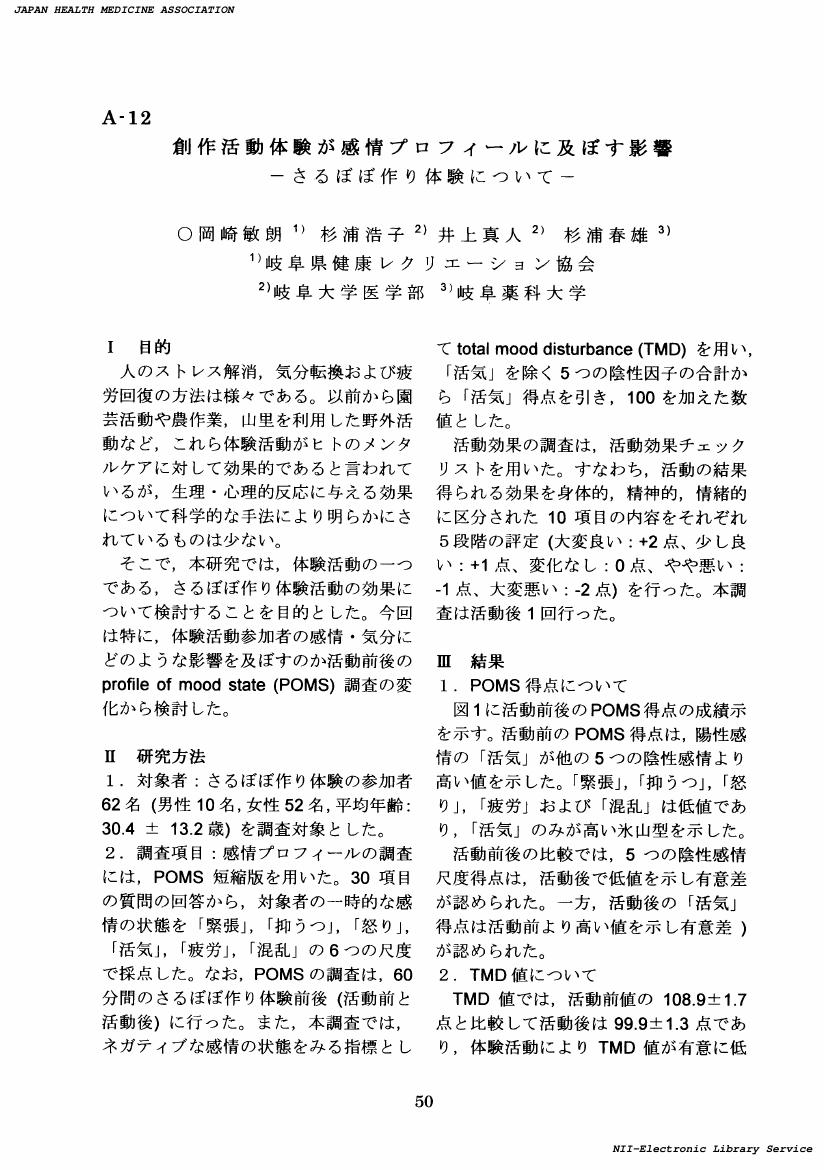1 0 0 0 IR レクリエーション活動前後の気分プロフィール(POMS)の変化について
- 著者
- 杉浦 春雄 西田 弘之 杉浦 浩子
- 出版者
- 岐阜薬科大学
- 雑誌
- 岐阜薬科大学基礎教育系紀要 (ISSN:13427245)
- 巻号頁・発行日
- vol.15, pp.17-33, 2003-12-20
In this study, we determined the effects of recreational activities (recreation games) on profile of mood states (POMS) in a small group of general population (4 males and 18 females, 40.0±2.5 years of age). In the pre-recreational activities, the vigor score of the participant was the highest value (14.3±0.9), and the score of the other five factors ranges from 6.5 to 10.8 points. The vigor score in the post-activities was significantly (P<0.01) higher than that in the pre-activities. The score of the other five factors (1.9 - 5.1 points) in the pre-activities was significantly (P<0.01 or P<0.001) low in the post-activities. The total mood disturbance (TMD) score in the post-activities was significantly (P<0.001) lower than that in the pre-activities. The recreational score of the post-activities indicated a high value in enjoyable, comfortable, satisfaction, sense of achievement, mental fatigue, shoulder stiffness and sleeping. There was a significant (P<0.05 or P<0.01) positive correlation between the vigor score of the post-activities and the comfortable, mental fatigue, shoulder stiffness, sleeping, and a significant (P<0.05) negative correlation between the TMD score of the post-activities and the satisfaction, mental fatigue. There was a significant (P<0.01) positive correlation between the vigor score of the post-activities and the recreational total score, and a significant (P<0.05) negative correlation between the recreational total score and the tension-anxiety score, the confusion score of the post-activities. These results suggest that recreational activities effectively decreased negative mood score and increased positive mood score in general population.
1 0 0 0 精神障害者の「生きる能力」の構造化と評価に関する研究
1.精神障害者の「生きる能力」を構造化構造化を試みるために,精神科デイケア利用者に面接調査を行った。調査内容は勝田モデルの枠組みに従い,(1)生産の技術に関する能力(2)人間の諸関係を統制したり調整したり変革したりする能力(3)自然と社会についての認識の能力(4)世界の状況に感応し表現する能力を調査した。デイケア利用者では,(2)の能力不足を感じる人が多く,この能力の向上が社会復帰意識を高めると考えられた。2.一般の人々の精神障害者の「生きる能力」評価一般の人々が精神障害者の「生きる能力」をどのように評価しているかを明らかにするため,4つの能力を細分化し,質問紙を作成した。一作成した質問紙を用い,M大学1年生138名と中高年層94名に調査を実施した。(1)精神障害者の「生きる能力の評価」:全体で評価の低かった能力は,人間関係の能力の中の「協調性がある」「リーダーシップがとれる」「トラブル時の対応」であった。また,生産技術の能力の中の「新たな技能や資格の習得」「長時間の勤務」も低かった。逆に高かったのは,表現する能力の中の「芸術への関心」「芸術的表現」であった。中高年層と大学生を比較すると,中高年層の評価の方が有意に低かったのは,認識の能力の中の「学力」「知能」,生産の技術の中の「家事労働」であった。学生の評価の方が有意に低い項目はなく,中高年層の方が偏見が強いことが明らかとなった。(2)精神障害者との社会的距離と「生きる能力」の関連:「生きる能力」の評価の低い人は,社会的距離の多くの項目で「受け入れにくい」と答えていた。また,人間関係の能力の評価の低い人は,社会的距離の友人・職場で「受け入れにくい」と答えた人が多く,社会的距離での受け入れと「生きる能力」の評価には,関連性がみられた。
